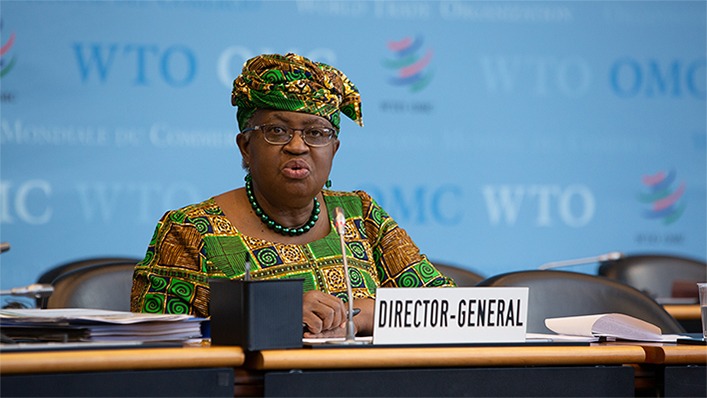WTO Warns of 1% Contraction in Global Trade as US Tariff Measures Escalate

The Director-General of the World Trade Organization (WTO), Dr Ngozi Okonjo-Iweala, has warned that newly unveiled trade measures by the United States could significantly disrupt the global economy, potentially shrinking global merchandise trade volumes by 1% in 2025.
In a strongly worded statement issued on 3 April, Okonjo-Iweala expressed deep concern about the broader economic ramifications of these actions and the heightened risk of escalating trade tensions among nations.
She noted that the United States’ latest measures, announced on 2 April, added to a growing list of protectionist policies enacted since the beginning of the year, leading the WTO to revise global trade projections downward by nearly four percentage points.
“The WTO Secretariat is closely monitoring and analysing the measures announced by the United States on April 2, 2025,” the statement read.
“The recent announcements will have substantial implications for global trade and economic growth prospects. While the situation is rapidly evolving, our initial estimates suggest that these measures, coupled with those introduced since the beginning of the year, could lead to an overall contraction of around 1% in global merchandise trade volumes this year,” it added.
Okonjo-Iweala warned that such policies could provoke retaliatory tariffs from other nations, potentially sparking a full-blown trade war with far-reaching consequences for international trade flows and economic stability.
She further highlighted the declining share of global trade conducted under the WTO’s Most-Favoured-Nation (MFN) rules, which has dropped from approximately 80% at the start of the year to just 74% following the latest developments.
She stressed the importance of maintaining open, fair, and predictable trade policies and urged WTO member states to resist the urge to escalate tensions.
“We encourage member nations to engage constructively through WTO mechanisms to prevent disputes from worsening and to safeguard global trade stability,” she stated.
The WTO chief reaffirmed the organisation’s role as a neutral platform for resolving trade disputes and fostering dialogue. She called on countries to recommit to multilateral cooperation and to uphold the principles of fair trade in the face of rising protectionism.
The WTO’s concerns follow a sweeping trade policy shift by former President Donald Trump, who announced a baseline 10% tariff on all imports into the United States beginning 2 April.
Under the new policy, the US will also impose higher reciprocal tariffs on countries that levy steeper duties on American goods.
The measures are expected to affect over 50 nations, including key global economies such as China, India, Japan, and the European Union, as well as numerous developing countries across Africa, Asia, and Latin America.
Nigeria, for instance, which currently imposes a 27% tariff on US exports, will now face a 14% US tariff on its own exports.
In Africa, other nations such as Mauritius and Algeria are also significantly impacted.
Mauritius, which enforces an 80% tariff on American goods, will be met with a 40% US tariff, while Algeria will face a 30% US tariff in response to its 59% rate.
Across Asia, countries including Vietnam (90%), Cambodia (97%), and Bangladesh (74%) on US goods will now see their exports to the United States taxed at 46%, 49%, and 37%, respectively.
China, which currently applies a 67% tariff on American products, will now face a 34% reciprocal tariff, while India’s 52% tariff will result in a 26% countermeasure.
European nations are not exempt. The European Union’s 39% tariff on US goods will now attract a 20% tariff from Washington.
The United Kingdom, Brazil, Singapore, Chile, and Australia—each of which imposes a 10% tariff on US products—will now face a mirrored 10% US tariff in return.
The sweeping scope of the new US policy signals a dramatic shift away from traditional trade diplomacy, prompting fears of tit-for-tat economic retaliation that could derail global recovery efforts and compound existing geopolitical strains.
As the WTO and international stakeholders continue to monitor the unfolding situation, calls are growing louder for renewed global cooperation and a recommitment to the rules-based multilateral trading system.







